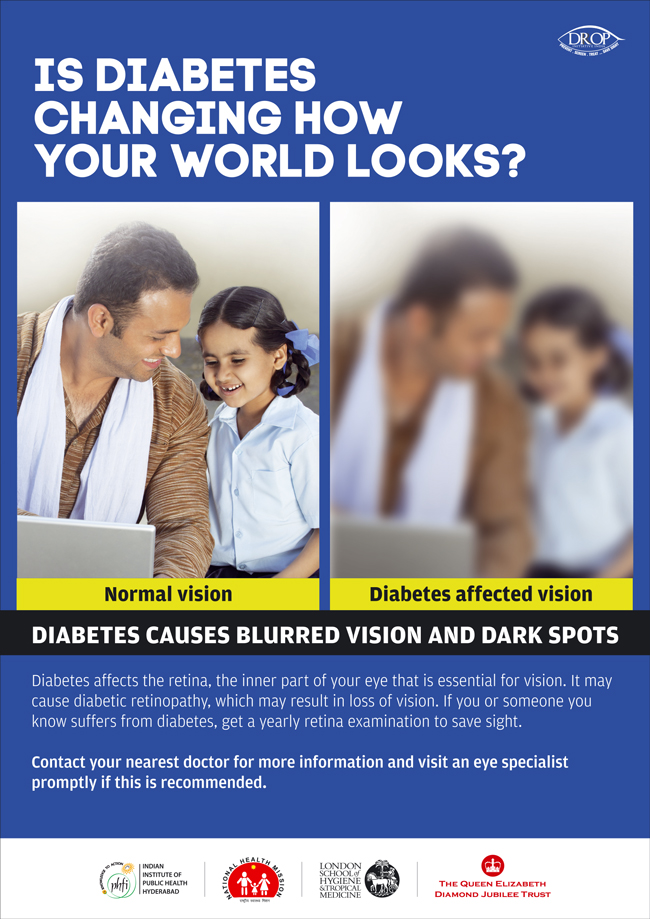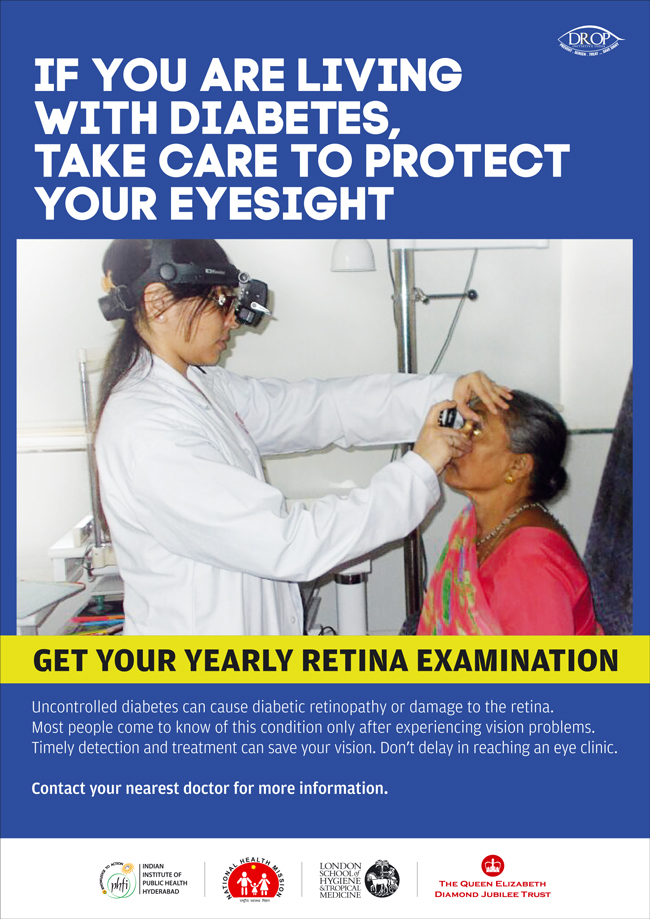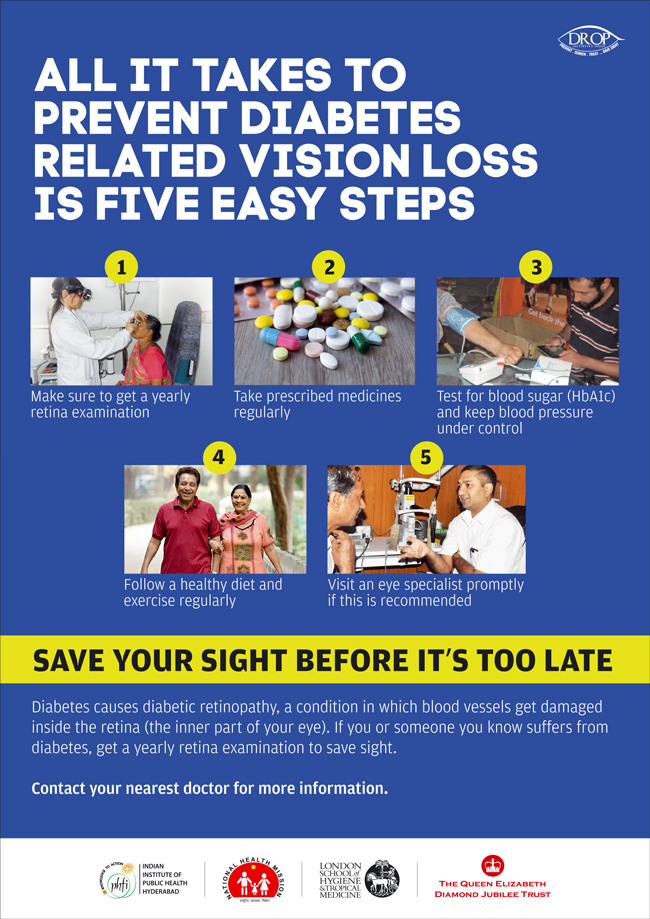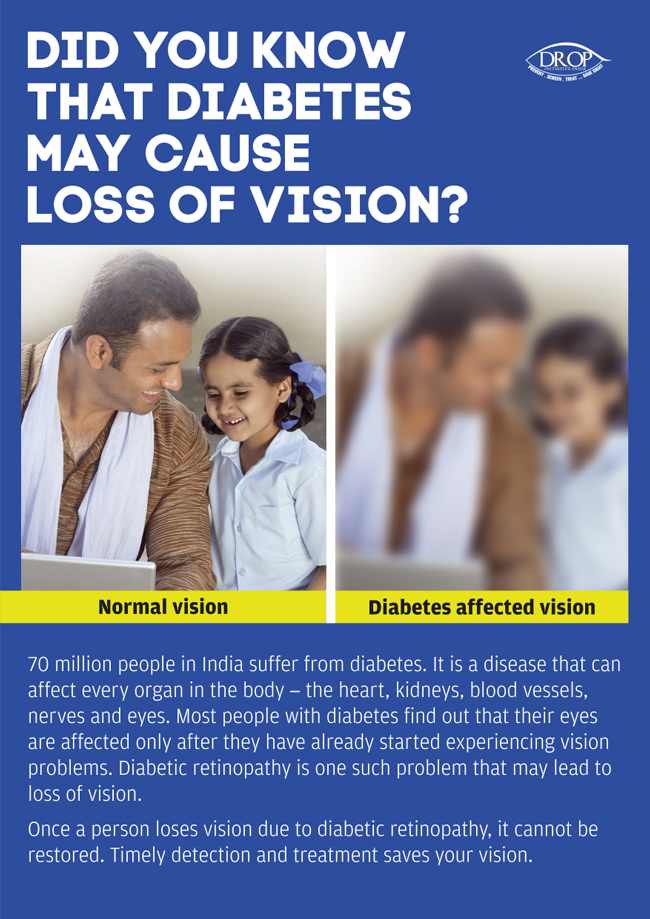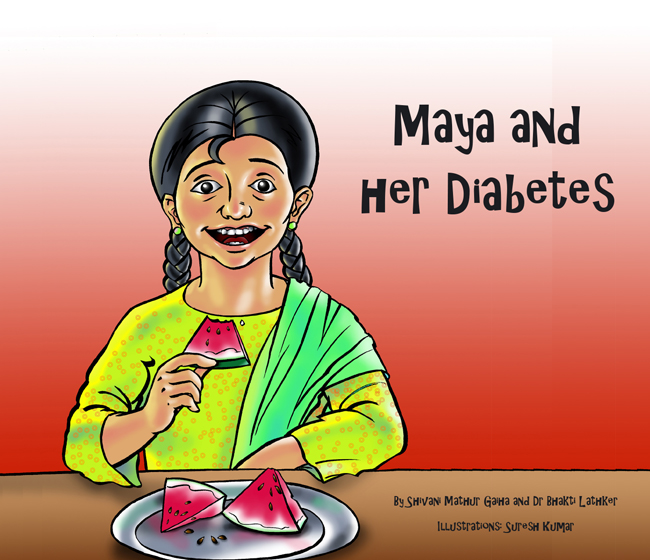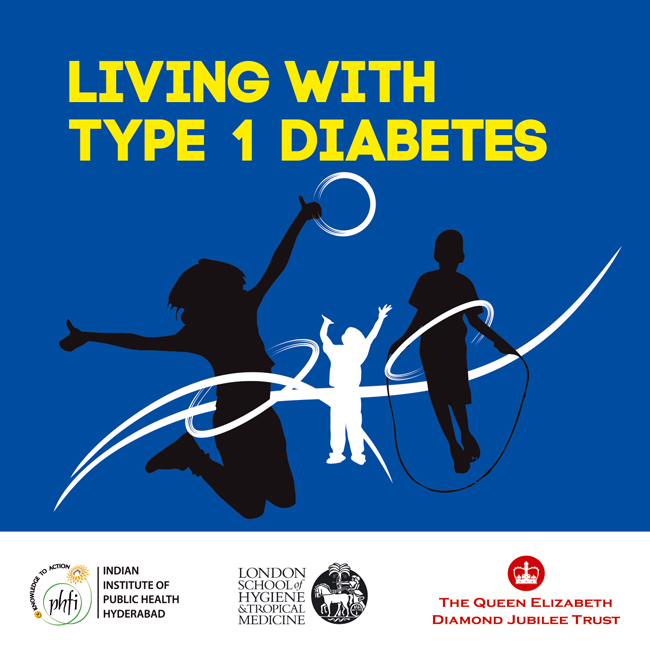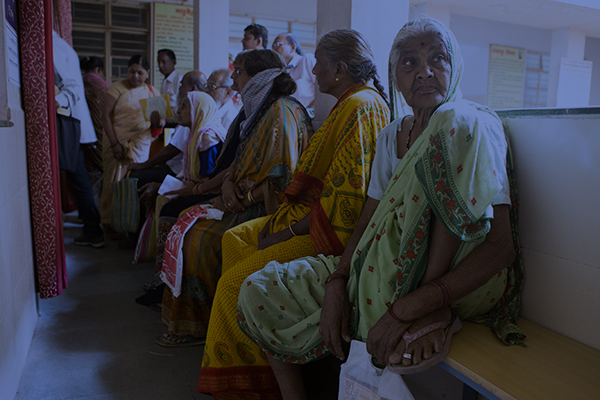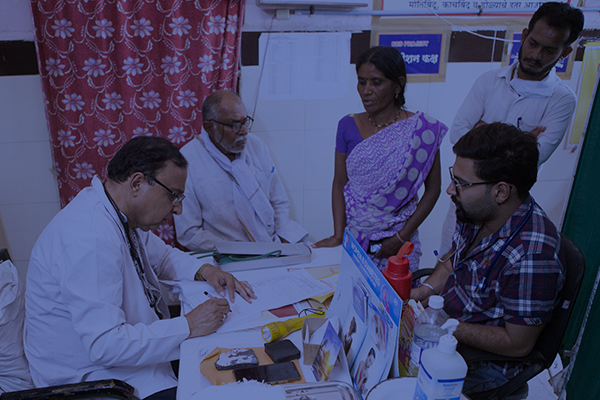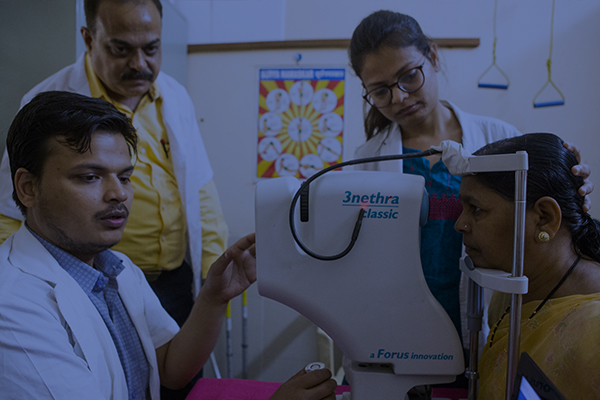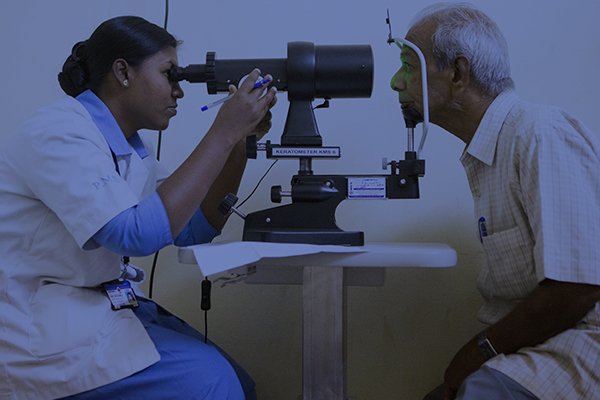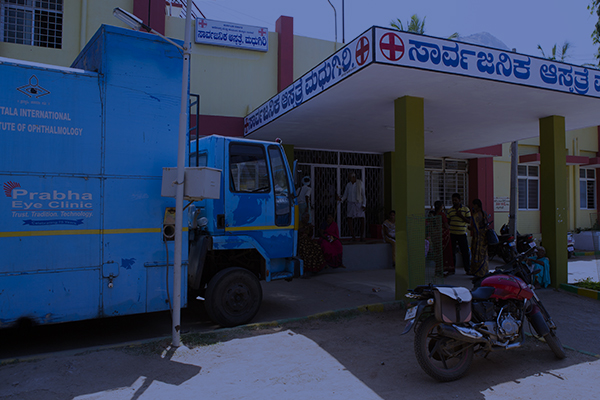What is Diabetic Retinopathy (DR)?
People with diabetes can develop an eye disease called Diabetic Retinopathy. This is when high blood sugar levels damage the blood vessels in the retina.
The retina is a light-sensitive part of the inside of the eye. Damage to the retina can lead to loss of vision. As the retina is inside the eye, damage might be occurring but the eyes look entirely normal.
In Diabetic Retinopathy the retinal blood vessels become leaky, or blocked. All of the following can lead to loss of vision:
- Leaky blood vessels can cause swelling of the retina
- Blocked blood vessels cause damage because not enough oxygen reaches the retina
- Abnormal blood vessels can grow on the retina. These blood vessels can cause bleeding inside the eye
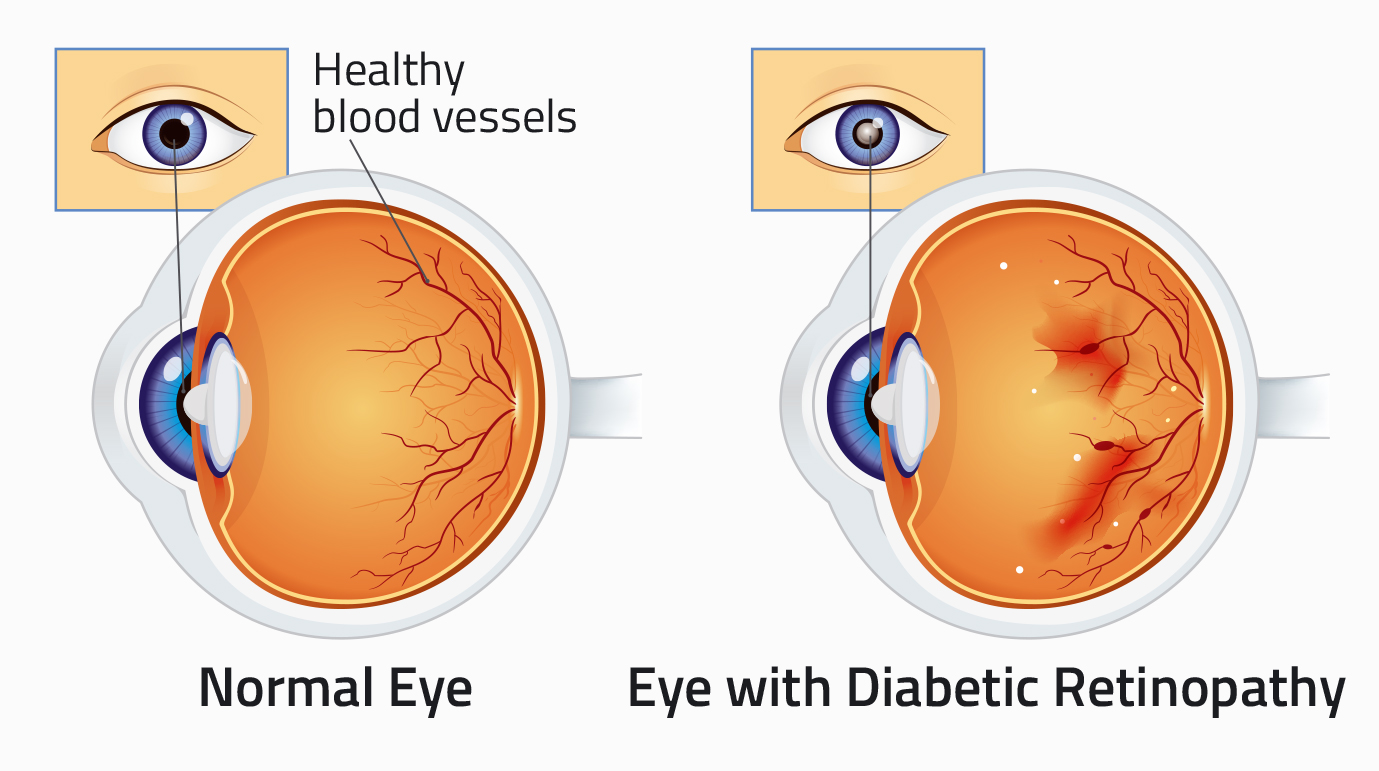
Symptoms
In the early stages of Diabetic Retinopathy, the vision is usually not affected. As the retinopathy progresses the vision can be affected. If the condition is ignored for a long time, it can lead to complete loss of sight.
Important
The risk of Diabetic Retinopathy is reduced if blood sugar levels and blood pressure are well controlled.
Should Diabetic Retinopathy develop, if detected early, it can be treated to preserve your vision. Once vision has been lost it cannot usually be restored.
- People who have had diabetes for more than five years
- People with poorly controlled blood sugar, blood cholesterol and blood pressure (see section on managing your diabetes)
- People with kidney complications
- Women who are pregnant
- Control your blood sugar, blood cholesterol and blood pressure
- Stop smoking
- Have an examination of your eyes every year. Do not wait until you have lost vision. Follow the advice you are given
As the inside of the eye needs to be examined in detail, this must be done by an eye specialist. Drops may be put in the eyes to enlarge the pupil of the eye. The inside of the eye may be examined by a special camera or a special torch (ophthalmoscope).
Make sure the specialist explains whether they have found any problems in your retina. If they have, it is very important that you follow their advice on whether further tests are needed or whether you need treatment.
There are three forms of treatment:
- Laser
- An injection inside the eye
- Surgery
You do not need to be admitted to hospital for laser treatment or injection. Treatment may need to be repeated. Surgery is only needed for very severe Diabetic Retinopathy. It is very important that you follow the advice of the eye specialist.
- Who is more likely to develop DR?
- People who have had diabetes for more than five years
- People with poorly controlled blood sugar, blood cholesterol and blood pressure (see section on managing your diabetes)
- People with kidney complications
- Women who are pregnant
- What can I do to maintain good vision?
- Control your blood sugar, blood cholesterol and blood pressure
- Stop smoking
- Have an examination of your eyes every year. Do not wait until you have lost vision. Follow the advice you are given
- Eye examination for DR
As the inside of the eye needs to be examined in detail, this must be done by an eye specialist. Drops may be put in the eyes to enlarge the pupil of the eye. The inside of the eye may be examined by a special camera or a special torch (ophthalmoscope).
Make sure the specialist explains whether they have found any problems in your retina. If they have, it is very important that you follow their advice on whether further tests are needed or whether you need treatment.
- Treatment of DR
There are three forms of treatment:
- Laser
- An injection inside the eye
- Surgery
You do not need to be admitted to hospital for laser treatment or injection. Treatment may need to be repeated. Surgery is only needed for very severe Diabetic Retinopathy. It is very important that you follow the advice of the eye specialist.
SAVE YOUR SIGHT by maintaining normal blood sugar levels, blood cholesterol and blood pressure; have regular eye examinations, with prompt treatment if needed.
FAQs
Yes, but only in very rare cases. Diabetic Retinopathy can cause blindness at a very advanced stage if necessary measures (screening, prevention and treatment) have not been taken in time.
Yes. Vision loss can usually be prevented in people with diabetes by regular eye examinations throughout their lifetime. In addition, the better the diabetes control, the better the chances of preventing complications that could lead to vision impairment.
An emergency consultation with a vision specialist is required when a sudden major change in vision is noticed.
The signs and symptoms of Diabetic Retinopathy can appear in one eye only, but usually both eyes are affected – though not necessarily equally.
Monitoring by an optometrist or an ophthalmologist is indispensable if you have Diabetic Retinopathy. The treatment required and the frequency of visits will be determined by your vision specialist.
No, Diabetic Retinopathy is not painful. The eye examinations required and the treatments available are not painful either.
Yes. In the vast majority of cases, people with Diabetic Retinopathy can get around on their own. Certain tools have been developed to make it easier for people with a vision impairment associated with advanced Diabetic Retinopathy to get around.
There are numerous vision aids (magnifiers, closed circuit televisions, etc.) that facilitate daily activities for people with advanced DR.
A very well-balanced diet and certain food guidelines are recommended for people with Diabetic Retinopathy. Sugars and fats, which increase blood sugar levels, must be avoided.
It’s always a good idea to quit smoking. Smokers are at greater risk of cardiovascular disease, and high blood pressure in particular – a risk factor in Diabetic Retinopathy.
New treatments available in the last few years have considerably improved the life of people with Diabetic Retinopathy by slowing the progression of the disease and reducing symptoms. Research is on-going, giving hope that future therapies will be even more effective in minimizing complications and perhaps even, one day, preventing the disease – or at least delaying its onset.
Diabetes Helpline
The diabetes helpline on 1800 121 2096 is for anyone who has diabetes or would like to know about diabetes and its management. Call us if you have questions on:
- What diabetes is
- Its prevention
- Pre-diabetes
- Type 1 diabetes
- Type 2 diabetes
- Gestational diabetes
- Diabetic Retinopathy
- Any other diabetes-related complications
Trained counsellors who have experience in diabetes management and extensive knowledge of the condition will speak to you in English, Hindi or Telugu languages. You can call Monday to Friday between 9am to 5pm. Or you can ask us your questions via email at dr.india@iiphh.org and we will respond to you at the earliest.
You can visit the Diabetes Helpline on the web too.
We can help you answer questions like:
- I feel thirsty, hungry and giddy these days and also feel like using the washroom frequently. Do I have diabetes?
- My vision is blurred. Can diabetes cause vision loss?
- What tests do I have to get done to detect whether I have diabetes?
- Can I eat everything or do I have to go on a diet? Can I drink alcohol?
- My child has diabetes and finds it hard to give up his/her chocolates and candies. Can I give him/her diabetic chocolates and sweets?
Call us even if you don’t have specific symptoms but suspect you may have diabetes or if you are feeling low or depressed and would like to speak to someone about changes in your health. Please be aware that we do not have your name, address or medical records. You must consult a diabetologist or a doctor near you to know about tests, sugar levels etc.
You can visit the Diabetes Helpline on the web too.
- Diabetes Helpline
The diabetes helpline on 1800 121 2096 is for anyone who has diabetes or would like to know about diabetes and its management. Call us if you have questions on:
- What diabetes is
- Its prevention
- Pre-diabetes
- Type 1 diabetes
- Type 2 diabetes
- Gestational diabetes
- Diabetic Retinopathy
- Any other diabetes-related complications
Trained counsellors who have experience in diabetes management and extensive knowledge of the condition will speak to you in English, Hindi or Telugu languages. You can call Monday to Friday between 9am to 5pm. Or you can ask us your questions via email at dr.india@iiphh.org and we will respond to you at the earliest.
You can visit the Diabetes Helpline on the web too.
- How can the Diabetes Helpline help?
We can help you answer questions like:
- I feel thirsty, hungry and giddy these days and also feel like using the washroom frequently. Do I have diabetes?
- My vision is blurred. Can diabetes cause vision loss?
- What tests do I have to get done to detect whether I have diabetes?
- Can I eat everything or do I have to go on a diet? Can I drink alcohol?
- My child has diabetes and finds it hard to give up his/her chocolates and candies. Can I give him/her diabetic chocolates and sweets?
Call us even if you don’t have specific symptoms but suspect you may have diabetes or if you are feeling low or depressed and would like to speak to someone about changes in your health. Please be aware that we do not have your name, address or medical records. You must consult a diabetologist or a doctor near you to know about tests, sugar levels etc.
You can visit the Diabetes Helpline on the web too.
Useful Links
| State | Training Institution | Website |
|---|---|---|
| Andhra Pradesh | PVRI Hyderabad | |
| Goa | HV Desai Eye Hospital, Pune (Current training institution for Ophthalmologists from Goa) | |
| Gujarat | Divyajyoti Trust, Mandvi, Surat (Dist.) | |
| Karnataka | VIIO Bangalore | |
| Kerala | Little Flower Hospital, Thrissur | |
| Maharashtra | MGIMS, Wardha | |
| Odisha | LV Prasad Eye Institute, Bhubaneshwar | |
| Rajasthan | Global Hospital, Mount Abu | |
| Tamil Nadu | Aravind Eye Hospital, Tirunelveli | |
| West Bengal | VMANN, Rural West Bengal | n/a |
| State | DR Screening Centres under the Project | DR Treatment Centres under the Project |
|---|---|---|
| Andhra Pradesh | CHC - Bobbili | PVRI - Vizainagaram |
| CHC - Cheepurpalli | ||
| Area Hospital - Parvathipuram | ||
| District Hospital - Vizainagaram | ||
| Odisha | CHC - Botalama | Capital Hospital - Bhubaneshwar |
| CHC - Balakati | ||
| CHC - Jatni | ||
| District Hospital - Khurda | ||
| West Bengal | CHC - Sabang | Medinipur Medical College (MMC) |
| CHC - Daspur | ||
| CHC - Garbeta | ||
| CHC - Sonakhali | ||
| CHC - Vidyasagar | ||
| CHC - Keshiyaari | ||
| District Hospital - Kharagpur | ||
| District Hospital - Ghatal | ||
| Gujarat | CHC - Areth | Divyajyoti Hospital, Mandvi (Surat Dist.) |
| CHC - Umarpada | ||
| CHC - Zankhvav | ||
| CHC - Mangrol | ||
| Goa | North Goa District Hospital (Asilio) - Mapusa | Goa Medical College (GMC), Bambolim |
| South Goa District Hospital (Hospicio) - Margao | ||
| Sub-District Hospital - Ponda | ||
| Cottage Hospital - Chicalim | ||
| CHC - Canacona | ||
| PHC - Sankhali | ||
| Maharashtra | Rural hospital - Seloo | MGIMS, Wardha |
| Rural Hospital - Hinganghat | ||
| Sub-District Hospital - Arvi | ||
| Civil Hospital - Wardha | ||
| Kerala | CHC - Chalakuddy | Little Flower Hospital, Thrissur / equipment recently transferred to DH |
| CHC - Chavakkad | ||
| CHC - Kunnamkulum | ||
| Taluk Hospital - Kodungalloor | ||
| Thrissur General Hospital | ||
| Tamilnadu | Upgraded PHC - Thisayanvilai | 1. District Hospital - Tirunelveli 2. Aravind Eye Hospital - Tirunelveli |
| Upgraded PHC - Thirukurunkudi | ||
| Upgraded PHC - Mukkudal | ||
| Upgraded PHC - Ukkirankottai | ||
| Upgraded PHC - Vairavikulum | ||
| District Hospital, Medical College & Hospital - Tirunelveli | ||
| Rajasthan | CHC - Sumerpur | 1. District Hospital - Pali 2. Global Hospital - Mount Abu |
| CHC - Sadri | ||
| CHC - Sojat | ||
| CHC - Jaitaran | ||
| District Hospital - Pali | ||
| Karnataka | CHC - Koratagere | 1. VIIO-operated Mobile Vans 2. At VIIO premises in Bangalore |
| CHC - Gubbi | ||
| CHC - Pavagada | ||
| CHC - Madhugiri | ||
| District Hospital - Tumkur |
- Links to Training Institutions
State Training Institution Website Andhra Pradesh PVRI Hyderabad Goa HV Desai Eye Hospital, Pune (Current training institution for Ophthalmologists from Goa) Gujarat Divyajyoti Trust, Mandvi, Surat (Dist.) Karnataka VIIO Bangalore Kerala Little Flower Hospital, Thrissur Maharashtra MGIMS, Wardha Odisha LV Prasad Eye Institute, Bhubaneshwar Rajasthan Global Hospital, Mount Abu Tamil Nadu Aravind Eye Hospital, Tirunelveli West Bengal VMANN, Rural West Bengal n/a - DR Screening/Treatment Centres under the Project
State DR Screening Centres under the Project DR Treatment Centres under the Project Andhra Pradesh CHC - Bobbili PVRI - Vizainagaram CHC - Cheepurpalli Area Hospital - Parvathipuram District Hospital - Vizainagaram Odisha CHC - Botalama Capital Hospital - Bhubaneshwar CHC - Balakati CHC - Jatni District Hospital - Khurda West Bengal CHC - Sabang Medinipur Medical College (MMC) CHC - Daspur CHC - Garbeta CHC - Sonakhali CHC - Vidyasagar CHC - Keshiyaari District Hospital - Kharagpur District Hospital - Ghatal Gujarat CHC - Areth Divyajyoti Hospital, Mandvi (Surat Dist.) CHC - Umarpada CHC - Zankhvav CHC - Mangrol Goa North Goa District Hospital (Asilio) - Mapusa Goa Medical College (GMC), Bambolim South Goa District Hospital (Hospicio) - Margao Sub-District Hospital - Ponda Cottage Hospital - Chicalim CHC - Canacona PHC - Sankhali Maharashtra Rural hospital - Seloo MGIMS, Wardha Rural Hospital - Hinganghat Sub-District Hospital - Arvi Civil Hospital - Wardha Kerala CHC - Chalakuddy Little Flower Hospital, Thrissur / equipment recently transferred to DH CHC - Chavakkad CHC - Kunnamkulum Taluk Hospital - Kodungalloor Thrissur General Hospital Tamilnadu Upgraded PHC - Thisayanvilai 1. District Hospital - Tirunelveli
2. Aravind Eye Hospital - TirunelveliUpgraded PHC - Thirukurunkudi Upgraded PHC - Mukkudal Upgraded PHC - Ukkirankottai Upgraded PHC - Vairavikulum District Hospital, Medical College & Hospital - Tirunelveli Rajasthan CHC - Sumerpur 1. District Hospital - Pali
2. Global Hospital - Mount AbuCHC - Sadri CHC - Sojat CHC - Jaitaran District Hospital - Pali Karnataka CHC - Koratagere 1. VIIO-operated Mobile Vans
2. At VIIO premises in BangaloreCHC - Gubbi CHC - Pavagada CHC - Madhugiri District Hospital - Tumkur
Peer Support Groups
Having diabetes can be difficult, as there seem to be more don’ts than do’s. It can make one feel lonely, awkward in social gatherings and sometimes a bit down. However, you are not alone.
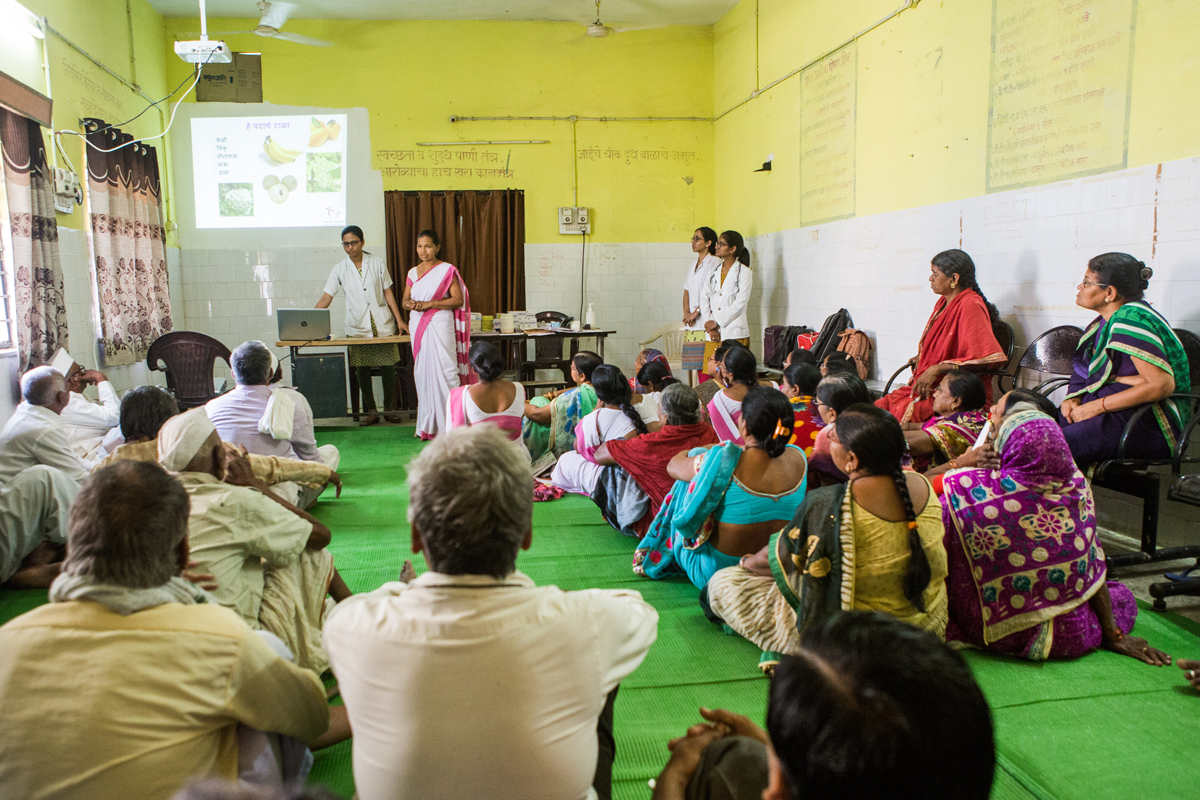
An ASHA worker talks about relevance of good diet to a group of people living with diabetes in Wardha, Nagpur. India ©PHFI
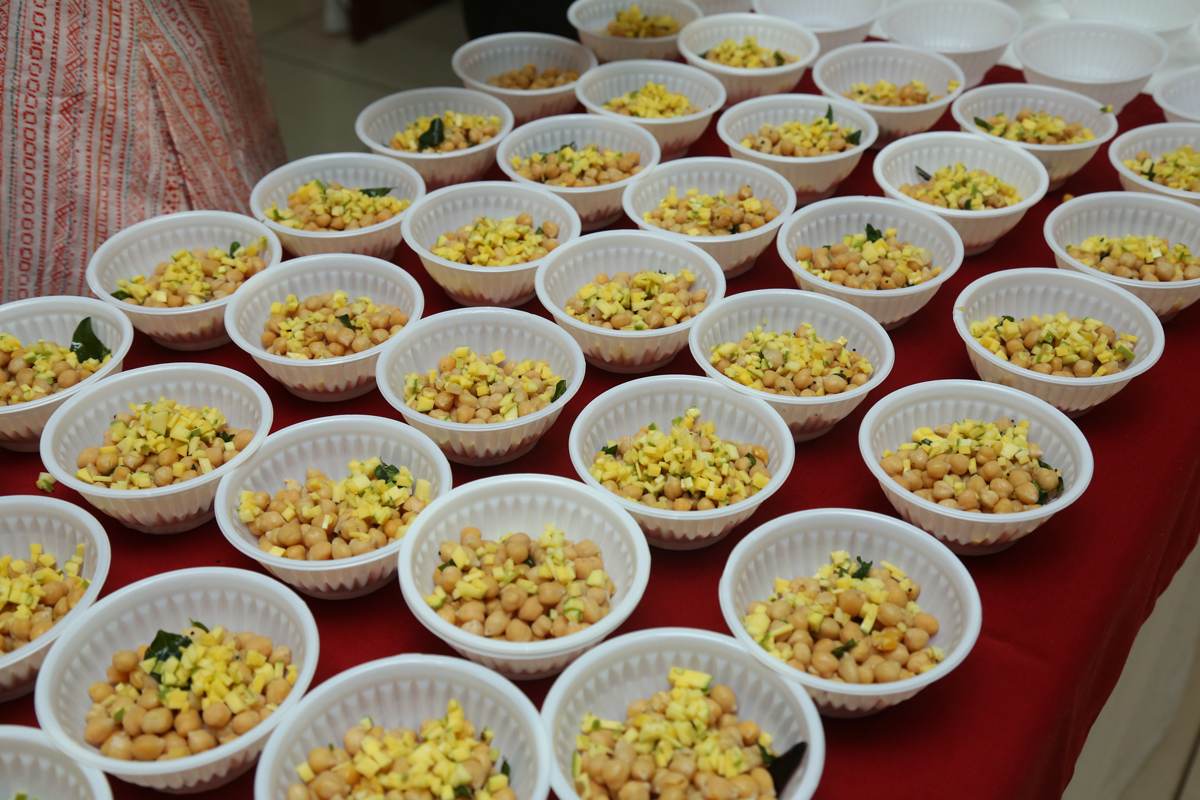
Members of Peer Support Groups are shown recipes for healthy food
The purpose of Peer Groups of people with diabetes is to provide the opportunity for you to share experiences, both good and bad. By spending time with other people who also have diabetes, you can find out that you are not the only one who is struggling with exercising regularly, remembering to take your medication, or losing weight, for example.
In each Peer Group, the members select someone from the group to be the leader. This person is then trained by a medical expert in diabetes, so that he or she can pass on the correct advice. The group decide for themselves, under the guidance of the leader, what they would like to do during meetings, and what topics to discuss. Some groups invite a physical fitness trainer to demonstrate suitable exercises. Or a dietitian, or someone within the group who has controlled their diabetes well, can give advice on tasty, healthy food and how to prepare it, as well as what to avoid or eat only occasionally.
Other activities include demonstrations on how to look after your feet or how to manage insulin, particularly when traveling or fasting. Some groups have demonstrations of simple yoga exercises, with discussion on how to build exercise into everyday life – ‘a little but often’ is a good motto. Sometimes a member invites the group to their home where cooking healthy food can be demonstrated, followed by eating together and having a good time.
Membership is free, and each group has a membership of varying number, usually between 10 and 15. There are usually separate groups for men and women.
Meetings are usually held in public spaces such as temples, halls, parks and so on.
To find out if there is Peer Support Group in your locality, ask a member of staff in the Non Communicable Diseases (NCD) clinic.
If there is not a group in your area, and you would like to know more about how to set one up, download this document.
If you have any questions about this, please contact us on drindia@iiphh.org
Gujarat
Tejas Eye Hospital, Mandvi
Contact person: Vimal Prajapati, Programme Manager; Mobile: 997961646
Maharashtra
Sindhi Colony, Wardha District, Maharashtra
Seloo, Wardha District, Maharashtra
Hinganghat, Wardha District, Maharashtra
Allipur village, Wardha District, Maharashtra
Contact person: Dr. Azhar Sheikh, Programme Manager; Mobile: 9975733332
- Purpose of a Peer Group
The purpose of Peer Groups of people with diabetes is to provide the opportunity for you to share experiences, both good and bad. By spending time with other people who also have diabetes, you can find out that you are not the only one who is struggling with exercising regularly, remembering to take your medication, or losing weight, for example.
- What Happens in Peer Group Meetings?
In each Peer Group, the members select someone from the group to be the leader. This person is then trained by a medical expert in diabetes, so that he or she can pass on the correct advice. The group decide for themselves, under the guidance of the leader, what they would like to do during meetings, and what topics to discuss. Some groups invite a physical fitness trainer to demonstrate suitable exercises. Or a dietitian, or someone within the group who has controlled their diabetes well, can give advice on tasty, healthy food and how to prepare it, as well as what to avoid or eat only occasionally.
Other activities include demonstrations on how to look after your feet or how to manage insulin, particularly when traveling or fasting. Some groups have demonstrations of simple yoga exercises, with discussion on how to build exercise into everyday life – ‘a little but often’ is a good motto. Sometimes a member invites the group to their home where cooking healthy food can be demonstrated, followed by eating together and having a good time.
- Additional Information
Membership is free, and each group has a membership of varying number, usually between 10 and 15. There are usually separate groups for men and women.
Meetings are usually held in public spaces such as temples, halls, parks and so on.
To find out if there is Peer Support Group in your locality, ask a member of staff in the Non Communicable Diseases (NCD) clinic.
If there is not a group in your area, and you would like to know more about how to set one up, download this document.
If you have any questions about this, please contact us on drindia@iiphh.org
- List of Locations
Gujarat
Tejas Eye Hospital, Mandvi
Contact person: Vimal Prajapati, Programme Manager; Mobile: 997961646Maharashtra
Sindhi Colony, Wardha District, Maharashtra
Seloo, Wardha District, Maharashtra
Hinganghat, Wardha District, Maharashtra
Allipur village, Wardha District, Maharashtra
Contact person: Dr. Azhar Sheikh, Programme Manager; Mobile: 9975733332




